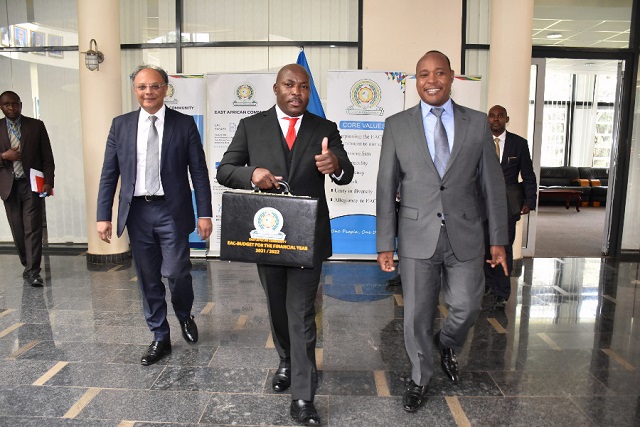
Kampala, Uganda | THE INDEPENDENT | The East African Community-EAC Council of Ministers has tabled the budget estimates for the 2021/2022 financial year totaling US$91,784,296.
The budget theme: Economic Recovery through Industrialization and Inclusive Growth, aims to focus on the policymakers, implementers and legislators at a time the COVID-19 pandemic had ravaged economies through lockdowns and economic shutdowns. This has affected economic performance in the entire region negatively.
The budget shows a drop from the 2020/2021 budget which was US$97.6 million, and the previous one which amounted to US$111.4 million. The partner states will also be required to contribute US$7.8 million, as opposed to the US$8 million that they paid in the year that is ending.
Adan Mohamed, the Council chairperson and also Kenya’s EAC Affairs Minister listed the 10 priority areas, including Private Sector Development, Peace and Security, Health and COVID-19 response, Trade development and Infrastructure development.
Others are the EAC Digitalization Agenda, Agriculture, Nutrition, Biodiversity, Environment and Circular economy.
The budget will also focus on expansion of membership to EAC and strengthening relationships with the African Union and other regional organizations (RECS), Institutional transformation including skills development, and promotion of awareness on the community.
Last week, the EAC started the assessment of the Democratic Republic of Congo’s application which if approved would expand the community to seven countries, a population of more than 280 million and a market value of US$270 billion in terms of GDP.
The EAC Secretariat is allocated almost half of the budget (US$43,858,070), while the East African Legislative Assembly will take US$15,465,345. The other big beneficiary is the Inter-University Council for East Africa with US$11,161,510, followed by the Lake Victoria Basin Commission – US$8,167,585.
According to the estimates, the East African Court of Justice is allocated US$3,791,723, while the East African Science & Technology Commission will get US$1,555,088.
The others are the East Africa Kiswahili Commission with US$1,284,219, the East Africa Health Research Commission with US$1,860,181, the East African Competition Authority with US$1,011,136 and the Lake Victoria Fisheries Organization with US$3,629,439.
The council also calls for the different organs of the EAC to plan for a pandemic that is not likely to go away soon.
The reality is that COVID-19 will be with us for a much longer time than earlier anticipated. The impact of the pandemic on EAC partner states economies has been devastating, to say the least.
Manufacturing and agriculture sectors have been affected due to disruption in global supply chains and a fall in global demand for key export goods such as horticulture produce,” said Mohamed.
During the year 2020, exports of goods shrank in all EAC partner states as both regional and international borders closed down. While the cargo was allowed to move, the supply chain was disrupted by the restrictions on the movement of persons, while a fall in demand in the export markets also meant low trade.
“For example, exports from Kenya and Uganda contracted by 7.6% and 1.7% respectively, between March to June 2020 while during the same period, imports of intermediate goods contracted by 25%, 11.3% and 22.9% in Kenya, Uganda and Tanzania respectively,” he said.
This affected personal incomes, government revenues as well as the ability of countries to meet their financial obligations. “Similarly, the industrial sector in Rwanda, Kenya and Uganda shrunk by 3.5%, 0.5% and 6.3% respectively.
In addition, Covid-19 has led to deteriorating external positions in all EAC partner states on account of its adverse consequences on tourism and aviation sectors, workers’ remittances, foreign direct investment and loan disbursements,” added the chair.
On the EAC Single Customs Territory, Mohamed said that during the next financial year, areas to focus on would include the comprehensive review of the EAC Common External Tariff (CET), EAC Customs Management Act 2004, and the EAC Regional Customs bond and the regulatory framework for the Assembly Sector.
The focus will also be on strengthening mechanisms to resolve customs related Non-Tariff Barriers (NTBs) that hamper intra EAC trade and the ongoing implementation of multinational road projects linking the partner states.
The Phase II One-Stop Border Post programme will include the design, construction and operationalization of 12 new prioritized OSBPs within the EAC.
“The Secretariat has further secured funding amounting to USD 1,748,565 from the African Development Bank for undertaking design of the multinational Burundi/Tanzania road: Mpanda (Vikonge)-Uvinza and Uvinza-Kanyani/Gisuru-Rusengo and Makebuko-Bugarama sections,” he said.
On civil aviation, the partner states committed to fully implement the Yamoussoukro decision to open up airspaces in line with the African Union plans of the Single African Air Transport Market (SAATM).
The Assembly also adopted several resolutions to further its legislative work, the notable one being, the resolution to establish an emergency fund to facilitate the response of the community to pandemics and disease outbreaks to the council.
******
URN
 The Independent Uganda: You get the Truth we Pay the Price
The Independent Uganda: You get the Truth we Pay the Price





